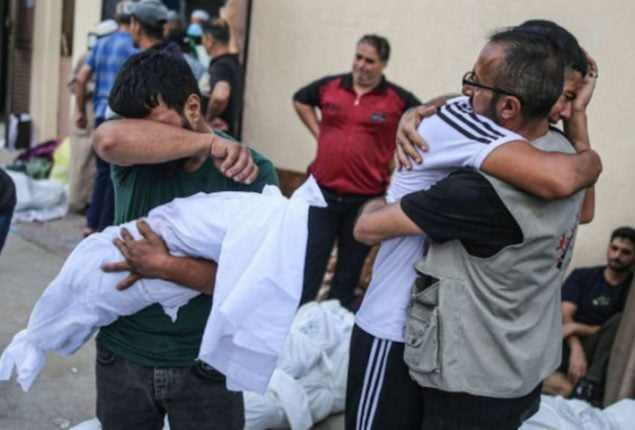Tsingtao Beer Employee Caught Urinating in Tank
Chinese authorities investigate viral video of Tsingtao employee urinating in tank. Video...

Israel-Hamas War: Gaza Hospitals in Crisis Mode as Airstrikes Escalate
At the Al-Aqsa Martyrs hospital in central Gaza, they are facing a shortage of materials to shroud the deceased.
Outside, in a courtyard, bodies are stacked, prayers are offered, and grief-stricken relatives collapse in sorrow.
Within the hospital, doctors are in a relentless struggle to treat those who can still walk and to rescue those severely injured.
However, their supplies of medicine and essential resources are dwindling rapidly.
A BBC Arabic correspondent observed a medical facility overwhelmed by a surge of casualties, where doctors rushed to complete procedures before attending to the next patient.
Some of the visuals from the hospital on Sunday are too distressing to share. Among the casualties are children, including at least two infants.
“We’ve been here since the crack of dawn and the bodies have completely filled the hospital yard, on top of the bodies which are in refrigerators which are full, inside the hospital building and outside,” a member of staff said.
“We don’t have enough shrouds for the bodies because the numbers are huge. All bodies are arriving in parts, unattached and in pieces. We can’t identify them because the bodies have been disfigured and crushed.”
He described the situation as “unbearable”, adding: “Despite everything we’ve witnessed before, these are scenes we’ve never seen.”
Similar scenes are unfolding in hospitals throughout the region as the Israel-Gaza conflict enters its third week.
At the al-Quds hospital in Gaza City’s Tel al-Hawa district, as a team of 23 doctors and nurses tended to over 500 individuals, nearby buildings were struck by bombs.
This information was relayed in a message from a doctor at the hospital to the BBC.
Both patients and civilians seeking refuge in the hospital were gripped by a “state of terror,” according to the doctor, who, for his own safety, chose to remain anonymous in a voice message.
Within what he described as a “catastrophic” healthcare situation, doctors were compelled to make difficult decisions regarding prioritizing patients for treatment, while others waited their turn.
“Many of the wounded have been waiting several days for surgery,” the doctor said. His voice message was passed on by Norwegian doctor and activist Mads Gilbert, of the Norwegian Aid Committee’s emergency team.
The medical staff has been depleted as some have been killed and others can’t reach the site. The remaining staff now share their building with 1,200 displaced people who are sheltering there.
“There are 120 wounded people with various injuries here, 10 patients are in ICU on ventilators, and we have about 400 chronic patients,” the doctor said.
“There are about 1,200 displaced citizens here – it is not easy to move such a large number of people so we decided not to evacuate.”
The Israeli military has reiterated its warning to all residents in the northern Gaza Strip to move south of Wadi Gaza, a stretch of wetlands that meanders across the region, for their own safety.
Gaza City is situated to the north of Wadi Gaza, while Deir al-Balah is located to the south.
While hundreds of thousands of people have evacuated to the southern parts of Gaza, thousands still remain in their homes in the north.
The Gaza health authority, controlled by Hamas, reported that dozens of individuals were killed in another series of overnight airstrikes on Sunday.
The Israeli military stated that it had targeted over 320 sites in the past 24 hours, including tunnels and outposts used by Hamas and its ally, Palestinian Islamic Jihad.
Hospitals throughout Gaza are facing dire shortages of supplies. Up to this point, only three small aid convoys have managed to enter Gaza.
Prior to the conflict, approximately 500 aid trucks were entering daily, as stated by a spokesperson from ActionAid Palestine.
Despite some food and medical supplies making it into Gaza, no fuel has entered the region since the start of the conflict. Hospitals are dependent on fuel-powered generators for their electricity.
On Sunday, UNICEF issued a warning that 120 babies in incubators, including 70 premature newborns on ventilators, rely on machines connected to backup generators that were deployed when Gaza’s electricity supply from Israel was cut off.
“We have currently 120 neonates who are in incubators, out of which we have 70 neonates with mechanical ventilation, and of course this is where we are extremely concerned,” said UNICEF spokesman Jonathan Crickx.
According to senior figures in the Israel Defense Forces, Hamas is alleged to store fuel reserves for its own use instead of making it available for the civilian population.
Fikr Shalltoot, the Gaza director for the charity Medical Aid for Palestinians, mentioned that some premature babies have been born during the latest round of conflict.
“On that ward there is a 32-week-old baby who doctors managed to save after its mother was killed in an air strike,” she told the media. “The mother and whole family died but the baby was saved.”
She emphasizes that if the generators cease operating, the child and other patients in the same ward are facing inevitable death.
The available fuel to keep these generators running is in critically short supply.
To stay informed about current events, please like our Facebook page https://www.facebook.com/BOLUrduNews/.
Follow us on Twitter https://twitter.com/bolnewsurdu01 and stay updated with the latest news.
Catch all the International News, Breaking News Event and Latest News Updates on The BOL News
Download The BOL News App to get the Daily News Update & Follow us on Google News.